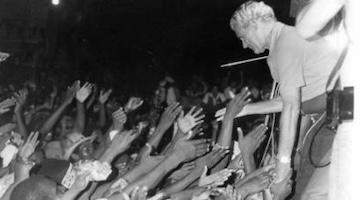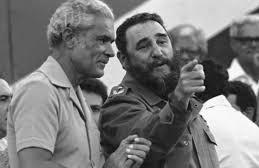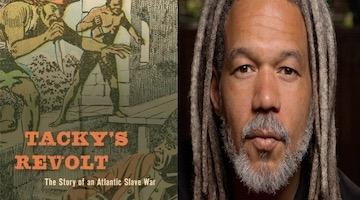The history of the Maroons of Jamaica’s Cockpit Country is a story of the difficulties of Black sovereignty and autonomy in an imperial world.
The Cockpit Country is a region of more than 74,000 hectares that sprawls across Jamaica’s western parishes. Rugged and largely uncharted, its topography is of steep limestone hills, gullies, pits, and valleys laid out over a network of rivers, streams, springs, glades, and ponds providing a critical freshwater source. It holds Jamaica’s largest remaining natural forest and is home to rare plants, birds, butterflies, and animals. The stark and inaccessible quality of the Cockpit Country encouraged the natural preservation of its ancient biodiversity.
The Cockpit Country’s seclusion also made it a natural haven for Africans escaping the brutality of slavery on Jamaica’s European plantations. While Jamaica was under Spanish rule (1493–1656), the Cockpit Country became the site for the establishment of Maroon communities forged through African alliance with the island’s remaining indigenous Taino populations. They engaged in guerilla warfare against the Spanish, using their knowledge of the terrain to their military advantage. This practice continued once the English invaded Jamaica in 1655. The English increased the importation of enslaved Africans to work on the expanding sugar-cane plantations.
Maroon communities terrorized the planters, emancipated enslaved Africans, and severely disrupted the profitability of the sugar economy. English attempts at pacification led to the First Maroon War (~1728), fought against the Maroons of the Cockpit Country (known as the Leeward Maroons) and those of the Blue Mountains in the easterly portion of the island (known as the Windward Maroons). The war ended when the English conceded defeat and signed treaties of pacification with the Leeward Maroons in 1739 (though the treaty is dated 1738) and Windward Maroons in 1740.
The 1739/1738 treaty, reprinted below, was signed at Trelawny Town. The Maroons received conditional sovereignty. They were granted land and their autonomy was respected, but they were also enlisted to capture and return runaway Africans. Moreover, conflicts between the Leeward Maroons and the colonial government flared into the Second Maroon War (1765-1796). At the conclusion of the war, the Maroons were betrayed by the English, who refused to sign a peace accord as promised. Instead, the English deported almost six-hundred Maroons to Nova Scotia. Unhappy with Canada, they would leave for Sierra Leone. By the 1840s, many would return to Jamaica.
After emancipation and after independence, the Maroons did not integrate into Jamaican society, preferring to retain their independence and autonomy. And, successive Jamaican governments have acknowledged Maroon autonomy, if only symbolically, while the status of these communities remains ambiguous. Today, however, the Maroon communities of the Cockpit Country are under a new threat, as is the Cockpit itself. While there have been discussions concerning the establishment of a Cockpit Country Protected Area, the integrity of the protected area is being threatened by mining permits issued to Noranda Jamaica Bauxite Partners II, a corporation partially owned by the Jamaican government. At the same time Richard Currie, chief of the Cockpit’s Accompong Maroons, is in an ongoing battle with the Jamaican government over the long-standing question of Maroon autonomy and sovereignty.
Articles of Pacification with the Maroons of Trelawny Town, Concluded March the first, 1738
In the name of God, amen. Whereas Captain Cudjoe, Captain, Acompong, Captain Johnny, Captain Cuffee, Captain Quaco, and several other negroes, their dependents and adherents, have been in a state of war and hostility, for several years past, against our sovereign lord the King, and the inhabitants of this island; and whereas peace and friendship among mankind, and the preventing of effusion of blood, is agreeable to God, consonant to reason, and desired by every good man; and whereas his majesty George the Second, King of Great Britain, France, and Ireland, and of Jamaica Lord, Defender of the Faith, &c. has, by his letters patent, dated February the twenty-fourth, one thousand seven hundred and thirty-eight, in the twelfth year of his reign, granted full power and authority to John Guthrie and Francis Sadler, Esquires, to negotiate and finally conclude a treaty of peace and friendship with the aforesaid Captain Cudjoe, and the rest of his captains, adherents, and others his men; they mutually, sincerely, and amicably, have agreed to the following articles:
First, That all hostilities shall cease on both sides for ever.
Second, That the said Captain Cudjoe, the rest of his captains, adherents, and men, shall for ever hereafter in a perfect state of freedom and liberty, excepting those who have been taken by them, or fled to them, within two years last past, if such are willing to return to their said masters and owners, with full pardon and indemnity from their said masters or owners for what is past; provided always that, if they are not willing to return, they shall remain in subjection to Captain Cudjoe and in friendship with us, according to the form and tenor of this treaty.
Third, That they shall enjoy and possess, for themselves and posterity for ever, all the lands situate and lying between Trelawney Town and the Cockpits, to the amount of fifteen hundred acres, bearing northwest from the said Trelawney Town.
Fourth, That they shall have liberty to plant the said lands with coffee, cocoa, ginger, tobacco, and cotton, and to breed cattle, hogs, goats, or any other stock, and dispose of the produce or increase of the said commodities of the inhabitants of this island; provided always, that when they bring the said commodities to market, they shall apply first to the custos, or any other magistrate of the respective parishes where they expose their goods to sale, for a license to vend the same.
Fifth, That Captain Cudjoe, and all the Captain's adherents, and people now in subjection to him, shall all live together within the bounds of Trelawney Town, and that they have liberty to hunt where they shall think fit, except within three miles of any settlement, crawl, or pen; provided always, that in case the hunters of Captain Cudjoe and those of other settlements meet, then the hogs to be equally divided between both parties.
Sixth, That the said Captain Cudjoe, and his successors, do use their best endeavors to take, kill, suppress, or destroy, either by themselves, or jointly with any other number of men, commanded on that service by his excellency the Governor, or Commander in Chief for the time being, all rebels wheresoever they be, throughout this island, unless they submit to the same terms of accommodation granted to Captain Cudjoe, and his successors.
Seventh, That in case this island be invaded by any foreign enemy, the said Captain Cudjoe, and his successors hereinafter named or to be appointed, shall then, upon notice given, immediately repair to any place the Governor for the time being shall appoint, in order to repel the said invaders with his or their utmost force, and to submit to the orders of the Commander in Chief on that occasion.
Eighth, That if any white man shall do any manner of injury to Captain Cudjoe, his successor, or any of his or their people, they shall apply to any commanding officer or magistrate in the neighbourhood for justice; and in case Captain Cudjoe, or any of his people, shall do any injury to any whiter person, he shall submit himself, or deliver up such offenders to justice.
Ninth, That if any negroes shall here-after run away from their masters or owners, and fall into Captain Cudjoe's hands, they shall immediately be sent back to the chief magistrate of the next parish where they are taken; and these that bring them are to be satisfied for their trouble, as the legislature shall appoint.
Tenth, That all negroes taken, since the raising of this party by Captain Cudjoe's people, shall immediately be returned.
Eleventh, That Captain Cudjoe, and his successors, shall wait on his Excellency, or the Commander in Chief for the time being, every year, if thereunto required.
Twelfth, That Captain Cudjoe, during his life, and the captains succeeding him, shall have full power to inflict any punishment they think proper for crimes committed by their men among themselves, death only excepted; in which case, if the Captain thinks they deserve death, he shall be obliged to bring them before any justice of the people, who shall order proceedings on their trial equal to those of other free negroes.
Thirteenth, That Captain Cudjoe with his people, shall cut, clear, and keep open, large and convenient roads from Trelawney Town to Westmorland and St. James's, and, if possible, to St. Elizabeth's.
Fourteenth, That two white men, to be nominated by his Excellency, or the Commander and Chief for the time being, shall constantly live and reside with Captain Cudjoe and his successors, in order to maintain a friendly correspondence with the inhabitants of this island.
Fifteenth, That Captain Cudjoe shall, during his life, be Chief Commander in Trelawny Town; after his decease the command to devolve on his brother, Captain Accompong; and in case of his decease, on his next brother Captain Johnny; and, failing him, Captain Cuffee shall succeed; who is to be succeeded by Captain Quaco; and after all their demises, the Governor, or Commander in Chief for the time being, shall appoint, from time to time, whom he thinks fit for that command.
In testimony, &c. &c.
“Articles of Pacification with the Maroons of Trelawny Town, Concluded March the first, 1738,” in Robert C. Dallas, The History of the Maroons (London, 1803).
















